New study provides encouraging data for younger breast cancer patients looking to pursue pregnancy
Patients who interrupted endocrine therapy to pursue pregnancy did not experience worse short-term recurrence rates and most were able to conceive
Breast cancer patients who paused their endocrine therapy to try to get pregnant experienced short-term rates of breast cancer recurrence similar to women who did not pause therapy for pregnancy, and most went on to conceive and deliver healthy babies, according to the new research from Dana-Farber presented today at the San Antonio Breast Cancer Symposium.
While breast cancer is most commonly diagnosed in middle-aged and older women, in the United States, about 5 percent of new diagnoses each year occur in women aged 40 or younger. These younger patients face some unique considerations, including fertility, said the study’s lead author, Ann Partridge, MD, MPH, vice chair of medical oncology at Dana-Farber and Founder and Director of the Program for Young Adults with Breast Cancer at Dana-Farber.
“Forty to 60 percent of patients who are diagnosed with breast cancer at age 40 or younger are concerned about their future fertility, especially if the disease occurs before they could decide whether to become a mother or not,” said Partridge.
Young women with early-stage hormone receptor (HR)-positive breast cancer are often treated with endocrine therapy, such as ovarian function suppression, aromatase inhibitors, or selective estrogen receptor modulators. To examine the impact of pausing endocrine therapy to pursue pregnancy, researchers designed the single-arm POSITIVE clinical trial (Pregnancy Outcome and Safety of Interrupting Therapy for Women with Endocrine Responsive Breast Cancer).
From December 2014 through December 2019, 518 women aged 42 or younger who desired to become pregnant enrolled in the study, opting to pause endocrine therapy for approximately two years to try to get pregnant. Before pausing their treatment, women had completed between 18 and 30 months of adjuvant endocrine therapy. If more than 46 breast cancer recurrences occurred within approximately three years of average follow-up, the trial would have been suspended. That threshold was not reached.
At a median follow-up of 41 months, 44 participants had experienced a recurrence of breast cancer. The three-year rate of recurrence was 8.9 percent, similar to the 9.2 percent rate in an external control cohort.
Of 497 women followed for pregnancy status, 368 (74 percent) had at least one pregnancy, and 317 (63.8 percent) had at least one live birth, with a total of 365 babies born. These rates of conception and childbirth were on par with or higher than rates in the general public.
Trial participants were strongly recommended to resume endocrine therapy after a pregnancy attempt or success. To date, 76.3 percent have resumed their therapy, the authors said. Partridge said the study provides encouraging guidance to younger women diagnosed with breast cancer who hope to have children.
“The POSITIVE Trial provides important data to support young women with HR-positive early breast cancer who are interested in a pregnancy and taking a break from endocrine therapy to pursue one,” said Partridge.
The researchers are continuing to follow the study participants to assess recurrence risk over time. They noted that the short follow-up to date is a limitation of the POSITIVE study, as HR-positive breast cancer can recur many years after an initial diagnosis.
The study is sponsored and conducted by the International Breast Cancer Study Group (IBCSG), a division of ETOP-IBCSG Partners Foundation, and by the Alliance for Clinical Trials in Oncology in North America, in collaboration with the Breast International Group (BIG).
This study was funded globally by IBCSG; Frontier Science & Technology Research Foundation Southern Europe; BIG against breast cancer and Baillet Latour Fund; Pink Ribbon Switzerland; Swiss Cancer League; San Salvatore Foundation; Rising Tide Foundation for Clinical Research; Swiss Cancer Research Group; Clinical Cancer Research Foundation of Eastern Switzerland; Gateway for Cancer Research; Breast Cancer Research Foundation; Roche Diagnostics International Ltd; Swiss Cancer Foundation; Piajoh Fondazione di Famiglia; Gruppo Giovani Pazienti “Anna dai Capelli Corti”; Verein Bärgüf; Schweizer Frauenlauf; C&A; Dutch Cancer Society; Norwegian Breast Cancer Society; Pink Ribbon Norway; ELGC K.K. Japan; Pink Ring Japan; Korea Breast Cancer Foundation; Yong Seop Lee and other private donors. In North America, funding came from the National Cancer Institute; Canadian Cancer Society; Canada Foundation for Innovation; RETHINK Breast Cancer; and the Gilson Family Foundation. The authors declare no conflicts of interest.
Media Contacts
If you are a journalist and have a question about this story, please call 617-632-4090 and ask to speak to a member of the media team, or email media@dfci.harvard.edu.
The Media Team cannot respond to patient inquiries. For more information, please see Contact Us.
